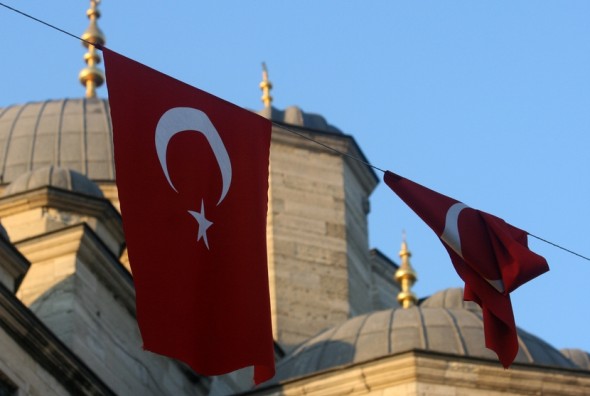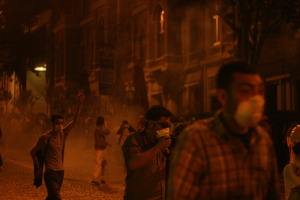By: Jackson Webster
On October 10th 2015, two suicide bombings shook Ankara, the Turkish capital, killing almost 100 Turks and wounding hundreds more. As if the death toll was not tragic enough, the victims of the explosions were peace demonstrators. The march in Ankara last Saturday was protesting the current government’s refusal to accept the offer of a three-week ceasefire by the Partiya Karkerên Kurdistanê (Kurdistan Workers’ Party, or PKK), proposed by the Kurdish leadership in light of the impending snap elections scheduled to be held on the 1st of November. The snap elections were announced by President Recep Tayyip Erdoğan in August after his Adalet ve Kalkınma Partisi (Justice and Development Party or AKP)—which saw its majority become a plurality in last June’s general elections— failed to form a coalition with opposition parties. Since the bombing, the Erdoğan government has imposed a “media blackout”, denying the Turkish press the ability to investigate the bombing further. Ignoring this government directive, the Turkish paper Cumhuriyet (Republic) has since published claims that the perpetrators crossed into Turkey from Syria at the border town of Kilis, just north of the Syrian city of Aleppo, which is currently embroiled in a bloody three-way struggle between rebel militias, government forces, and ISIS. To add to the controversy, as of October 17th, Cumhuriyet —a popular and frequently anti-government Turkish-language newspaper— published an article claiming to have found evidence that Turkish security services had been wire-tapping the suspected bombers, yet were surprisingly unable to stop the attack. The validity of these claims could not be confirmed by additional sources at the time of the article’s publication.
The first Cumhuriyet report neither supports nor attacks the unofficial government stance, articulated by Prime Minister Ahmet Davutoğlu, which claims that the PKK and ISIS were “likely in cooperation” and were jointly responsible for the October 10th bombings. Despite the ludicrous nature of this accusation, one can see the reasoning for the government looking to curate this highly improbable narrative. Turkey is currently waging an air campaign against the PKK in Anatolia, the Kurdish Peshmerga in Syria and Iraq, and the Islamic State. Thus, it follows that the Erdoğan government would want to use the bombing to rally support behind further military action against both the PKK and ISIS.
The bombing in Ankara comes during a delicate period in Turkish politics, due to both the AKP’s uneasiness with its lost majority status and the extremely volatile nature of opposition groups, both inside and outside parliament. The most notable opposition parties, Cumhuriyet Halk Partisi (Republican People’s Party or CHP) and Milliyetçi Hareket Partisi (Nationalist Movement Party or MHP), were not able to reach an agreement with the AKP over the creation of a cabinet following the June general elections. This failure of government-formation was attributed by Foreign Policy’s John Hannah to the AKP, which allegedly was dogmatic and unwavering in negotiations with opposition parties to the point where the Nationalist Party leader Devlet Bahçeli refused to meet with Prime Minister Davutoğlu immediately following the bombings. In addition, the Halkların Demokratik Partisi (People’s Democratic Party or HDP) has accused the government of negligence, criticising the Turkish intelligence services for not being able to prevent the attack, with some members even going so far as to hint at intentional government ignorance of a terrorist attack which conveniently targeted activists protesting government policy.
What both the political antagonism and the bombings themselves articulate and exacerbate is the truly tenuous nature of Turkish security, the questionable state of its democracy, and the lack of logical continuity in recent foreign policy. The bombing itself calls into question whether the vast and expensive Turkish internal security apparatus is truly able to protect its citizenry and state. The Turkish people elected the AKP on promises of safety, yet the recent frequency of attacks within Turkey has shown how Ankara’s long and sometimes porous border with Syria presents serious security challenges. Additionally, the government’s media blackout following the bombing, going so far as to keep mourning family members away from the blast sight, is indicative of the state of the free press in Turkey today. Indeed, as the investigation continues, how the government will respond to further reports from Cumhuriyet and other papers that may be critical of its handling of the recent crisis will be an excellent indicator of how an AKP majority would conduct itself should the Turkish people choose Erdoğan’s party in the coming snap elections.
The ruling AKP’s failure to see the interconnectedness of the crises it has faced in its neighbourhood has lost touch with the sound policy which saved the Turkish nation-state from dissolution following the First World War, and future administrations in Ankara would do well to learn from the secular, populist, and calculated examples of their twentieth-century predecessors. Turkey’s foreign policy over the last decade —the brain-child of current Prime Minister and then-Foreign Minister Davutoğlu—has been coined “zero problems with neighbours”. The original idea of the policy was essentially to pursue close ties with all countries in Turkey’s region. This task has proved difficult considering that, since the policy’s inception, Syria has erupted into civil-war-turned-proxy-war, Iran and Saudi Arabia have grown more belligerent, Israeli-Turkish relations have suffered under a conservative government in Jerusalem, and Russia has annexed Ukrainian territory. Simultaneously forming energy ties with the Russian government against the will of a distinctly pro-European and anti-Russian population has cost the Erdoğan government support both domestically and in Brussels. The policy of non-intervention in the Peshmerga’s struggle for Kobanê and subsequent delays in allowing for coalition access to Turkish airfields soured NATO opinions towards Turkey, just as Ankara was filing an Article IV declaration (formal request for a meeting of the North Atlantic Council). NATO’s discontent with Turkish policy regarding Syria can arguably be seen in the withdrawal of Patriot missiles from Turkey first by Germany and the Netherlands, and last week by the United States. Though the relevance to last week’s bombings in Ankara is debatable, Turkish policies of attempting to play too many sides in harshly divisive conflicts such as Syria and Ukraine could find Ankara frighteningly alone should violence between the government, PKK, and the potential spillover of the fight against IS and other groups in Syria escalate beyond the control of Turkish security forces.
Modern Turkey, a NATO member-state and traditionally stable regional power, currently faces existential threats to the state’s ability to govern both from within and without. The dire nature of these threats originates not from opposition groups, but from the ruling party figure head and strongman Erdoğan’s policy and rhetoric. Turkey’s advantageous geopolitical position as a bridge between the European and Muslim worlds has been squandered by a series of policy miscalculations. Equally, NATO members, preoccupied for most of 2014 by Russian actions in the Baltic and Ukraine, are beginning to direct their attention southward to Asia Minor and the Levant. Ankara’s geographical privilege has been wasted on a policy seeking to solidify support within its homogeneous core voter-base while forgetting that it presides over a multicultural, and multi-ethnic society. A heterogeneous population can add vibrancy to open democracies, but such diverse electorates are the bane of repressive states. Future Turkish governments, regardless of the party from which they originate, will have to face the above myriad of diverse threats. The security of the Turkish nation-state as we know it cannot be taken for granted in light of current instability. Ultimately, the Ankara bombing is one more variable to enter into the calculations of Turkish grand strategy, yet another sign of the instability both in and around Anatolia. Perhaps Turkey, much like the Ottoman Empire of old, cannot be ruled: it must be administered.
Update: Since the initial writing of this article, a Turkish court has lifted the “media blackout” on coverage of the attacks and investigations into those responsible, despite the ban being ignored by more critical newspapers like Cumhuriyet. Additionally, the first suspect has been named: Yunus Emre Alagöz, a young man from the southeast of Turkey who’s brother Şeyh carried out a similar suicide attack in Suruç this July. Both brothers had allegedly discussed sympathies with the Islamic State in Syria in online exchanges.
Jackson Webster, a Los Angeles native, is in the final year of an International Relations degree at the King’s College London Department of War Studies. He is the President of the KCL United Nations Association and is a content editor for Dialogue Magazine.

